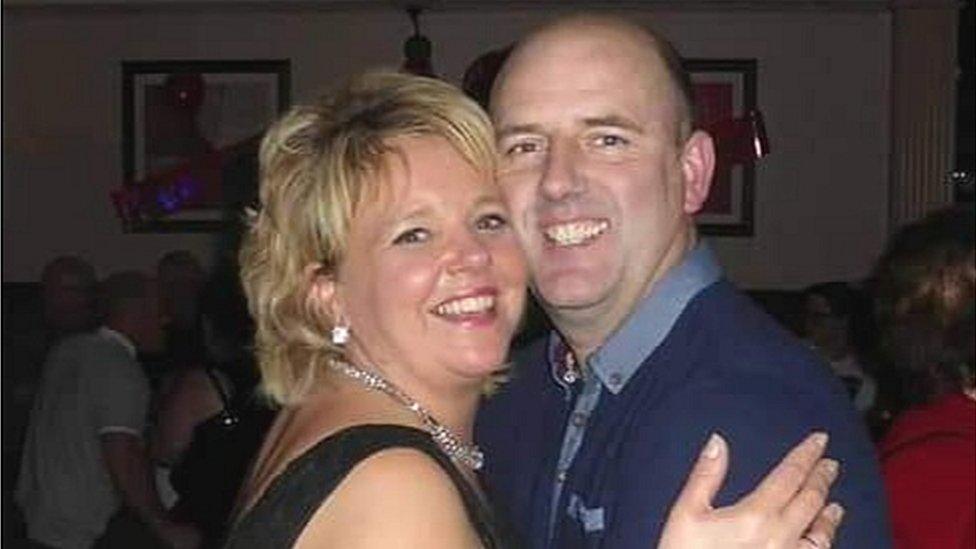Widow Jacqui English tells of shock at sudden death
- Published

Jacqui and Tommy English - his sudden death was shocking for his family
A woman whose husband died suddenly of a cardiac arrest has spoken out about her family's distress in a bid to alert others to the dangers.
Tommy English, a father of two from Dunmurry, was 50 years old when he died in his sleep in October 2017.
"He was the last person anyone expected this to happen to," said his wife.
Jacqui English was speaking as the British Heart Foundation reported the first rise in deaths from heart and circulatory disease in 50 years.
The charity said the historic pace of progress in reducing such deaths had "slowed to a near standstill".
In Northern Ireland in 2017, there were 1,102 deaths in under-75s from heart and circulatory conditions, up from 1,053 in 2014.
The charity said that the overall deaths from heart and circulatory disease in Northern Ireland had risen to 3,780 in 2017.
That means about ten families lose a loved one to a heart or circulatory disease every day and three of those people will die before their 75th birthday, the charity said.
Mrs English said her husband walked for miles every day in his job with Northern Ireland's Rivers Agency and had also undergone health checks every two years.
On the day of his heart attack she said he had enjoyed a "lovely Sunday" with his family and had been organising a charity football match.
"We went to bed that night as usual and the next morning, sadly, he didn't wake up.

Tommy and Jacqui English with their children, Jamie and Beth
"We will never get over the shock of this or the loss of a wonderful husband and father."
"Our beautiful children , Jamie who is now 22 and Beth who is now 18, are amazing people and Tommy's legacy will continue to live on through them."
She said the couple had many plans for their future together.
Mrs English said the family still did not know exactly what caused Mr English's cardiac arrest. But she wanted to share his story to alert people to the dangers.
Fearghal McKinney, head of BHF NI, said the latest figures were "worrying".
"We need to see in Northern Ireland a comprehensive strategy to tackle cardiovascular disease. Heart and circulatory diseases are still a leading cause of death here, and the biggest globally.
"We need to work in partnership with our political leaders, health and social care and medical research community to accelerate research into improving treatments further.
"With the continued commitment of our researchers and the public's generous support, we hope that the next ten years will see us make unparalleled progress towards our vision of a world free from the fear of heart and circulatory diseases."
The BHF aims to raise funds to support £1 bn of research over the next ten years to save and improve the lives of those affected by heart and circulatory diseases.
- Published30 March 2018

- Published29 September 2017

- Published6 November 2017
